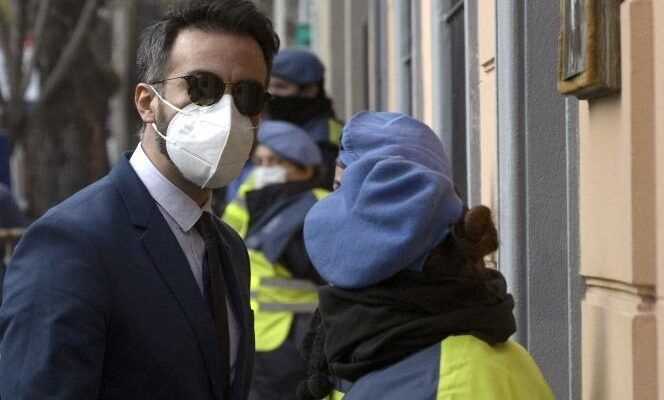Leopoldo Luque is considered the main member of Diego Maradona’s bedside medical team. The neurosurgeon rejected, Monday, June 28, all responsibility for the death in November of the former Argentine football star and asked the prosecutor for a new medical expertise.
“Dr Luque has nothing to be ashamed of. He simply said that he always took care of Maradona’s health and that whenever he was called for something, he gave her assistance ”said Me Julio Rivas at the end of his client’s hearing.
Dr Luque, 39, personal doctor and confidant of the former player, was heard for four hours by the prosecutor of San Isidro, in the suburbs of Buenos Aires, who opened an investigation for “manslaughter with aggravating circumstances” .
“He was her family doctor, but he was not in charge of home hospitalization”, added the advice of the doctor who made no statement. According to the doctor’s lawyers, the responsibility for the hospitalization of the former world champion in this house fell to two private health companies.
New expertise required
In addition, against an expert report released in May, lawyers said there was no medical evidence showing that Diego Maradona suffered from heart problems.
“The medical commission took medical files dating from 20 years ago”, criticized Me Rivas, claiming Diego Maradona had four check-ups between 2019 and 2020 that included heart exams. “All these exams showed it was perfect” in the matter, he declared.
According to his lawyer, Dr Luque asked for a new expertise on the conditions of the death of the champion who suffered from various health problems. At the beginning of May, twenty experts had concluded that it had been “Abandoned to his fate” by his healthcare team, whose treatment “Inadequate, deficient and reckless” had led him to a slow agony.
The medical team singled out
Leopoldo Luque was the last of seven members of the medical team to be questioned in connection with the investigation. The neurosurgeon had become the Argentinian star’s doctor after being contacted to treat his sleep disorders. Diego Maradona had suffered from insomnia for years and took large amounts of anxiolytics and tranquilizers which he sometimes combined with alcohol, according to relatives.
Before him, prosecutors heard from two nurses, their supervisor, a doctor coordinating home care, a psychologist and a psychiatrist. During these hearings, Leopoldo Luque and psychiatrist Agustina Cosachov, 36, were singled out as being primarily responsible for the former player’s health.
M’s lawyerme Cosachov, Me Vadim Mischanchuk, however, argued on Friday that his client “Was a psychiatrist, that she had nothing to do with the clinical control of the patient (…) who died of a coronary problem which is in no way related to the psychiatric problems she was dealing with”.
“There were a lot of warning signs that Maradona was going to die overnight. None of the doctors did anything to prevent it ”, had denounced a few days earlier Me Rodolfo Baqué, lawyer for nurse Dahiana Madrid.
Nurses place responsibility on the hierarchy
The nurse Ricardo Almiron, who looked after the patient at night, and his colleague Dahiana Madrid, responsible for monitoring him during the day, did nothing but“Apply the indications of treating physicians”, according to Me Baqué.
The coordinating doctor of home care, Nancy Forlini assured that her task was limited to managing the prescriptions of the two “Attending physicians”.
Nursing coordinator Mariano Ariel Perroni said his role was purely administrative and organizational.
The prosecution suspects the healthcare team of having “Violated the duties incumbent on each of them (…) by increasing the risk beyond the permitted margin, which led to the fatal outcome of the patient, which could have been avoided”. The seven members face a referral to court depending on the findings of the investigation and, if applicable, sentences of eight to 25 years in prison.
